5. James Whitmore (Harry S. Truman) in Give ‘Em Hell, Harry! (Steve Binder, Peter H. Hunt, 1975)
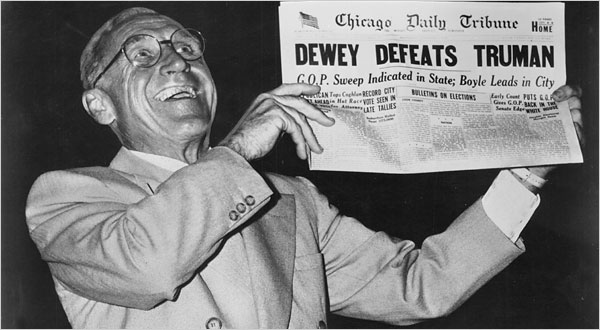
Though beloved by many Americans, Harry S. Truman’s presidency has been subject to a slew of different analysis throughout the years. He was considered a weak and unremarkable president by many, while others commended his firm stance on the Cold War and his wish for peace after what probably was a regretted decision, his authorization to drop the atomic bomb on Hiroshima in 1945.
In the one-man show Give ‘Em Hell, Harry!, a slogan often repeated by his supporters, James Whitmore breathes life into the ex-president’s retelling of his life and time in office, delivering a celebrated performance that is to this date the only one-man movie turn ever nominated for an Oscar.
Idealized and written as a play by Samuel Gallu, most of the dialogue in Give ‘Em Hell, Harry! is based on available records, and portrays Truman’s life through a series of scenes in which Whitmore passes his character for a tough captain in World War I, a hopeful and brash candidate, a troubled president and a fearless defender of the Bill of Rights.
Whitmore’s virtuoso performance was filmed live on stage, and his rapid-fire portrayal of the tough commander-in-chief is truly stunning to watch, true to the man’s famous words: “I don’t give ‘em hell, I tell the truth and they think they’re in hell”.
4. Henry Fonda (Abraham Lincoln) in Young Mr. Lincoln (John Ford, 1939)
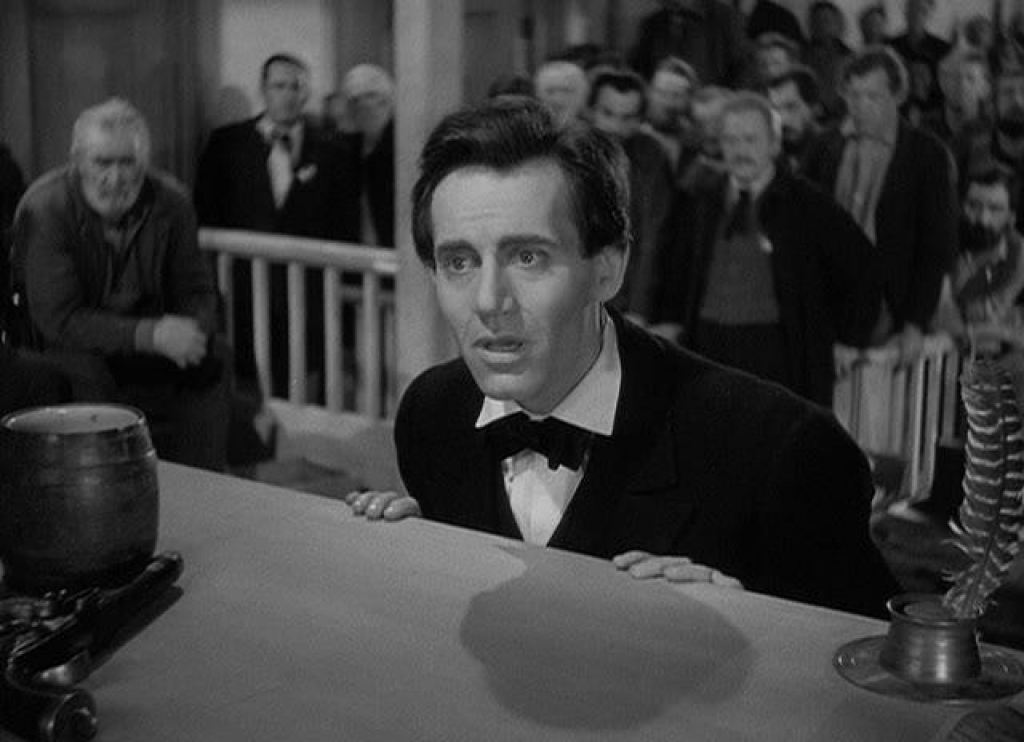
Considered by many John Ford’s finest film (which is sure saying something), Young Mr. Lincoln is a fictionalized account of Abe Lincoln’s early days as a lawyer in Springfield, Illinois, and his defense of two men accused of murder in a political brawl.
Although not based on actual events on the celebrated 16th president’s life, Young Mr. Lincoln retains a real hold over the man’s myth and truth, his impressive presence, charisma and intelligence. It’s a revering portrait of the character, for sure, but it also touches on an acute sense of not belonging that accompanied Lincoln throughout his life. In the time-lapse portrayed in the film (around 10 years), he loses his girlfriend and meets his future wife, Mary Todd.
Henry Fonda’s remarkable performance as the would-be president is Young Mr. Lincoln’s most valuable asset, as Ford confides in the great actor not only to replicate the trademark physical traits of the character, but to flesh him out and balance out the idealizations and realities in the film. He does so with pristine care and a complete performance, working the body language and the deep, acute, preoccupied eyes of an idealist in near-despair of the world.
3. Daniel Day-Lewis (Abraham Lincoln) in Lincoln (Steven Spielberg, 2012)
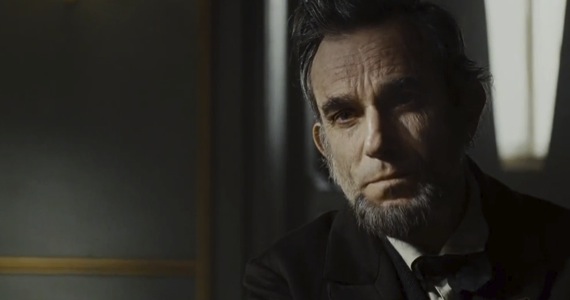
Daniel Day-Lewis’ famous inside-out method acting earned him three Oscars in his career, a feat only rivaled among thespians by Jack Nicholson and Meryl Streep. The thir one was for Lincoln, Steven Spileberg’s superb take on the most admired president of the United States in his last months of administration, desperately trying to get the 13th amendment through Congress, seeking to end slavery once and for all.
Spielberg’s movie’s triumph is its minute analysis of politics’ backroom dealing and closed-curtains meetings, and the portrait of Lincoln as a frustrated and tired man with a noble cause, facing opposition and family turmoil with the preoccupied stare of a man who’s been dealing with this for far too long.
Dead at the age of 56, Lincoln seems and sounds much older in Day-Lewis’ able characterization. His grasp on the restless spirit of the politician make the philosophical musings and clunkier parts of Spielberg’s movie feel like a natural and welcome addition to the phenomenal political drama that it is.
His intimate portrait of this man occupying a powerful position, fearlessly idealist and yet tremendously haunted by difficulties he keeps facing, is as riveting as the battle for the 13th amendment approval. It’s no wonder Day-Lewis is up there with Streep and Nicholson as one of the most honored in Academy’s history (they all still lose to Katherine Hepburn’s four wins, though).
2. Frank Langella (Richard Nixon) in Frost/Nixon (Ron Howard, 2008)
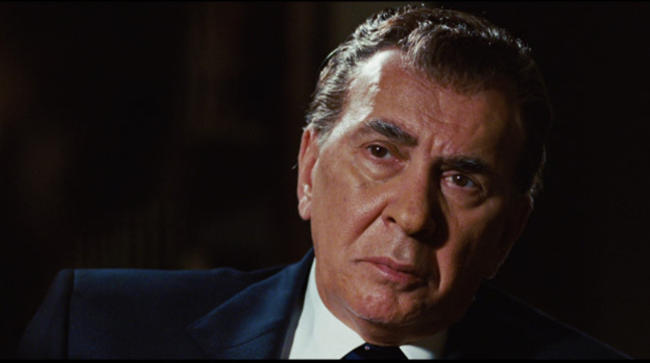
In a way, Ron Howard’s scathing reconstitution of the Frost/Nixon interview in his like-titled movie is an exercise in rhetoric. It’s the meaning of Nixon’s perhaps most infamous phrase (“I’m saying that when the president does it, it is not illegal!”) that sets the movie on fire near the end, and the dealings to make the interview possible are full of deceits and manipulations of logic and words.
Adapted from a stage play by Peter Morgan, Frost/Nixon had already earned Frank Langella a Tony when he was called to repeat the part in the movie, and the always brilliant actor wisely chose to tone it down for the more limited surroundings of the screen.
It’s still all there, though: in Langella’s terrific performance, Nixon is an imposingly physical man, a force to be reckoned with, a boogeyman from America’s worst nightmares, but also a broken and confuse fella that represents and embodies a lot more than the failings of just one man.
Langella’s stand-out moments are during the interview itself, of course, but his Nixon is a complete creation, an unforgiving yet very human take on a president whose time in office, and following scandals, haunt Americans to this day. A courageous performance by a spectacular actor who was rarely well-used onscreen.
1. Philip Baker Hall (Richard Nixon) in Secret Honor (Robert Altman, 1984)
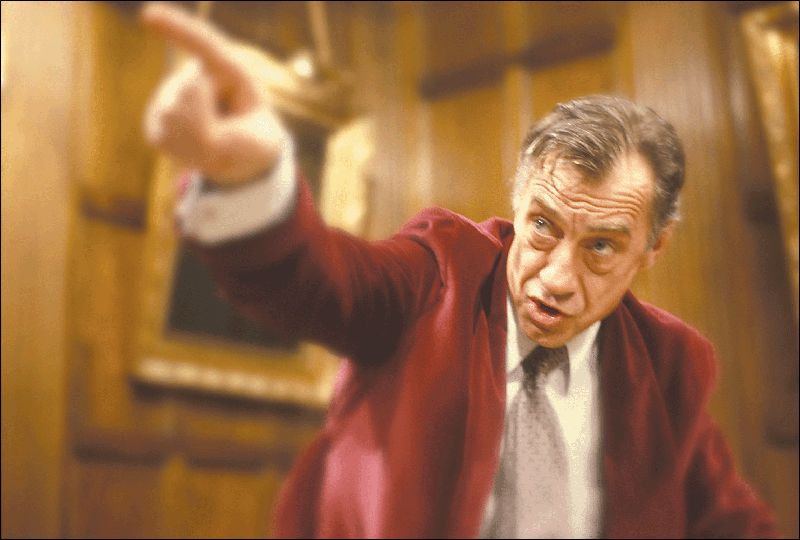
Isn’t presidency essentially a one-man show? Yes, you have your political aides, your Secretary of State, your House of Representatives, “helping” you run the country, but when everything falls apart or everything goes exceptionally well, it’s always on you.
Presidency as a lonely business has been a cliché for a long time now, but Robert Altman’s Secret Honor takes it to a whole new level by portraying an elderly Richard Nixon, post-Watergate, rambling into a microphone in his study, accompanied only by a bottle of booze and a rambling mind.
Altman’s lifelong hatred of Nixon and his administration obviously transpire into the film – Secret Honor is not willing to forgive or forget, but it is willing to humanize the character in a way that makes him almost pathetic. It’s a masterstroke, as it usually is with Altman.
Phillip Baker Hall’s performance is the stuff for which the term “tour de force” was invented. The veteran actor’s exclusion from that year’s Academy Awards was lamented by many, and with good reason. Bringing this nightmar-ish Nixon to life for Altman must have been an ungrateful job, as the actor and the director chose not to rely on make-up to make him inhabit the character.
It’s pure rage, hypocrisy, fear and verbosity that carry Baker Hall’s Nixon through the film, a demanding yet indispensable movie for any American history buff, or simply admirers of good acting and filmmaking.
Author Bio: Caio Coletti is a Brazilian-born journalist, a proud poptimist, and has too many opinions to keep them all to himself.